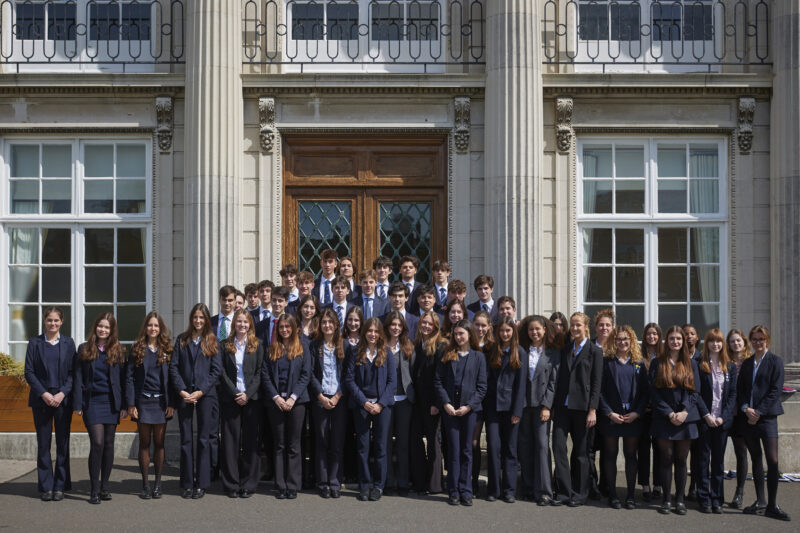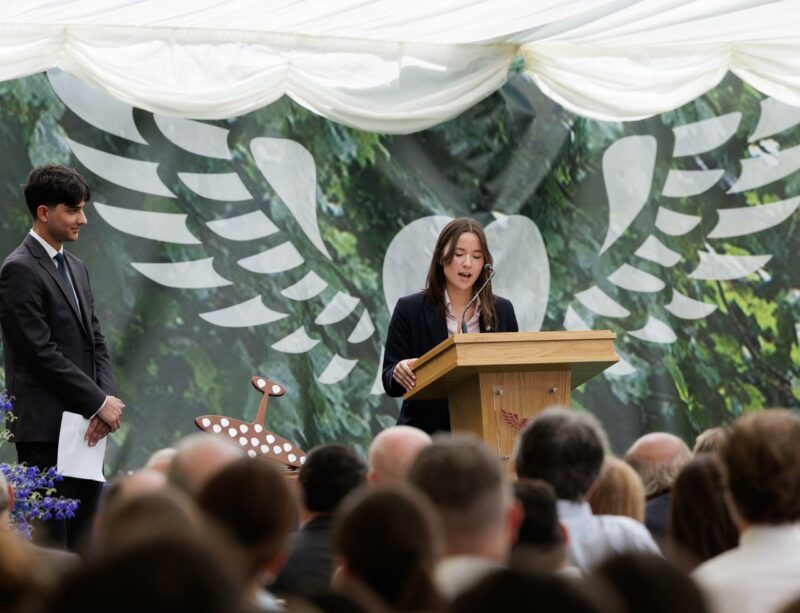This website uses cookies so that we can provide you with the best user experience possible. Cookie information is stored in your browser and performs functions such as recognising you when you return to our website and helping our team to understand which sections of the website you find most interesting and useful.
Dr Schroeder calls for integration of Europe
Europe will only be able to hold its own against the economic might of America and Asia as a single market and a political unit, according to the former Chancellor of Germany, Dr Gerhard Schroeder.
Dr Schroeder was speaking at Speech Day at Haileybury last Saturday.
"Europe has to react to global competition and its ageing population at an economic and political level. In my view, this means that we need to continue on the path towards European integration," he said.
"We need strong European institutions with the power to act. This applies to the area of economic and social policy, but also particularly to foreign and security policy.
"We also need to overcome people’s scepticism towards the enlargement of the European Union.
"I am always astonished when I hear people complaining about the risks of enlarging the European Union. On the contrary, we should always remember the political, cultural and economic benefits that the EU enlargements have brought for the member states.
"We need the Balkan states and Turkey to join the European Union – for both political and economic reasons. This is the only way we can secure stability and prosperity in Europe over the long term. This is particularly true of Turkey, which is not just tremendously important to Europe on economic grounds (but) especially important for reasons of security policy as it forms the bridge between Europe and Asia and the Arab states. It is an anchor of stability in a restless region.
"If Turkey can succeed in combining democracy and Islamic faith, this will be an enormous security boost for Europe," he stressed.
Dr Schroeder also spoke extensively about the role education plays in the future of Europe. "A real education has to develop young people’s powers of reasoning. It has to give them direction, and help shape their system of values. It is only when knowledge is combined with values that we are able to act responsibly and take responsibility for our actions."
He called on governments to provide greater expenditure on education and research. "Expenditure on education and research in Europe is too low by international standards. If you look at the efforts being made in Asia in particular, you will see that we cannot afford to carry on like this. With China growing so rapidly, this gap will widen if we don’t do something about it.
"We need more investment in childcare, more investment in schools and universities, more investment in research and development.
"If we want to be successful in the future – economically, scientifically and culturally – then we have to make full use of the potential Europe has to offer in terms of talent, aptitude and skills. No talent must be allowed to remain undiscovered. Each and every individual must be given the opportunity to receive a first-class education.
"Where parents’ resources are not sufficient, state and society must help out – by means of support programmes and grants. We can no longer to afford a situation where a good education is conditional upon parents’ income.
"This kind of first-class education determines the future of each young person and their opportunities on the job market. But it also determines Europe’s ability to compete.
"Young people are enthusiastic about using technology, but not about developing and designing it – despite excellent career opportunities in these areas. What we need in Europe is a mood that once again places a high value on research and innovation."
Dr Schroeder also touched on the need for a "healthy environment", adding that without it, economic success cannot be sustained.
"A key issue safeguarding natural resources is a forward-looking energy policy, based on energy conservation and renewable energy sources, like solar and wind power. If we fail to live up to this responsibility, we will destroy the natural foundations of life for our children. We don’t have an alternative to life on this planet. So there is no alternative to following a sustainable environmental policy.
"We can meet these challenges if society as well as governments embrace these tasks and if responsible citizens take on responsibility for themselves and for the common good. But this kind of attitude has to be learnt.
"And where do people learn it? Mainly in places where education takes place – in families, at schools and at universities. This is where the decision will be made about what kind of society we will live in in the future."




